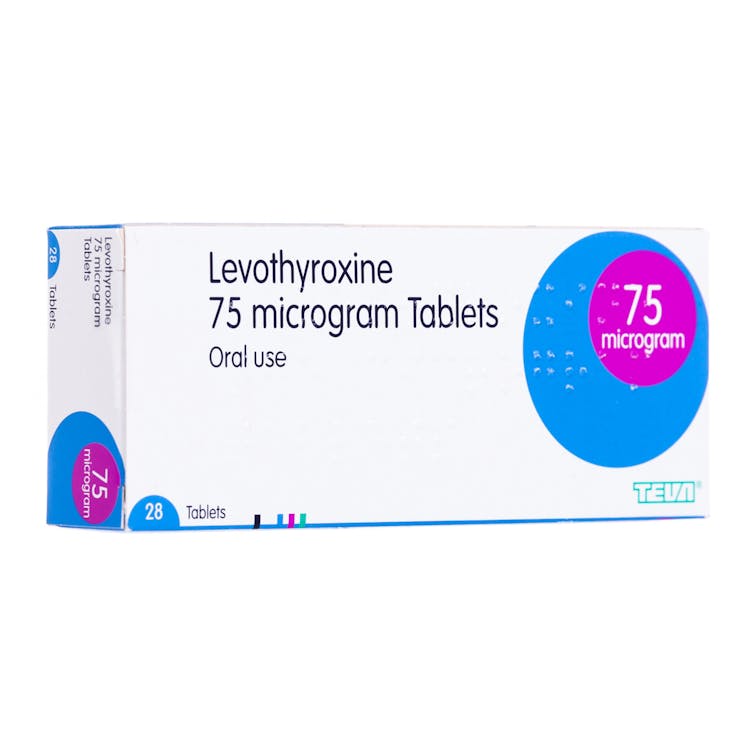Levothyroxine
Imágenes únicamente para fines ilustrativo
Levothyroxine is a medication taken to replace or add to the thyroid hormone that your body naturally produces. If you take levothyroxine will need regular blood tests to check that the medication is keeping your thyroid level within the normal range.
- Effective thyroid treatment
- Replaces hormones
- Prevents symptoms
- Genuine medication
- Shipped from EU Pharmacies
Más información
What is Levothyroxine?
- Levothyroxine replaces the natural thyroid hormone that your body makes
- Thyroid hormone is needed to give you energy and control growth
- Levothyroxine is often used to treat an underactive thyroid
- Some people with an overactive thyroid will have their natural thyroid hormone blocked, and then take levothyroxine to replace it to a healthy level
- Most side effects occur if your dose of levothyroxine is too high
- It is important to read the patient leaflet for a full list of side effects and cautions.
How Does Levothyroxine Work?
Levothyroxine is a hormone drug that works in a similar way to the body’s natural thyroid hormone. Thyroid hormone affects most organs in the body, and has an impact on your heartbeat, weight loss and energy levels.
Thyroid hormone can also have an impact on your hair, menstrual cycle, and whether you feel hot or cold.
When your body does not produce enough thyroid hormone, this is called hypothyroidism. You may gain weight, become constipated or feel tired. Levothyroxine replaces the hormone to make sure that vital processes within the body can still occur.
If your body produces too much thyroid hormone, this is called hyperthyroidism. You may lose weight, feel anxious, notice a fast heartbeat or trembling in your hands. Your doctor may prescribe a tablet to block your body from making any thyroid hormone, but then replace it with a safe dose of levothyroxine.
How is Levothyroxine Taken?
Levothyroxine Tablets
Levothyroxine is usually taken once a day in the morning. Swallow the tablet whole with a glass of water.
It is best to take it about 30 minutes before having breakfast or a caffeinated drink such as tea or coffee. This is because caffeine can prevent the absorption of levothyroxine.
What is the proper dosage of Levothyroxine?
Levothyroxine 12.5mcg / 25mcg / 50mcg / 75mcg / 100mcg
Levothyroxine comes in doses of 25 micrograms, 50 micrograms and 100 micrograms. A microgram is much smaller than a milligram. You may need to take several tablets to make up the dose you are prescribed.
The usual starting dose of levothyroxine is between 50 micrograms and 100 micrograms. People over 50, or those with heart disease, may start on a lower dose of levothyroxine.
Your dose of levothyroxine may change, especially when you first start taking it. Your dose will depend on the amount (if any) of thyroid hormone your body is still naturally making, and how your body responds to levothyroxine.
What side effects can Levothyroxine have?
As with all medications, levothyroxine can have side effects. These most commonly occur if your dose of levothyroxine is too high. Signs that your dose might be too high include:
- Nausea or vomiting (feeling sick or being sick)
- Diarrhoea
- Headaches
- Feeling restless or difficulty sleeping
- Sweating
- Tremors or shaking of the hands
- Muscle cramps
- Flushing.
Speak to your doctor if you experience these side effects. They may need to do a blood test to check the level of hormone in your blood, and then reduce the dose accordingly.
Occasionally, more serious side effects can occur. These include:
- Chest pain
- Fast or irregular heartbeat (palpitations).
Call a doctor straight away if you experience either of these.
If you have a severe allergic reaction (anaphylaxis) including breathlessness, lip or tongue swelling, call 999 immediately.
What warnings does Levothyroxine come with?
Levothyroxine may not be suitable for everyone. In particular, patients should check with a doctor before taking levothyroxine if they have a heart problem including angina or heart disease, have ever had a heart attack, or have high blood pressure.
Patients with diabetes may need to increase their diabetes medications on starting levothyroxine. You should discuss this with your doctor or prescriber.
If you have ever had an allergic reaction to a medication in the past, have an overactive thyroid or have a problem affecting your adrenal glands you should let your doctor or prescriber know.
During the Consultation with EU Meds, you will be asked to complete a health questionnaire to check that levothyroxine is suitable for you.
A prescriber from EU Meds will review your current medications, including any herbal remedies or supplements, to ensure that levothyroxine will not interact with them.
Once prescribed, you can order levothyroxine online for home delivery.
Buy Levothyroxine
Buying Levothyroxine Online
Can I buy Levothyroxine online?
You can safely buy Levothyroxine online at EU Meds. You will first need to have an online consultation with a pharmacist independent prescriber before your order will be supplied. The online consultation will ensure that Levothyroxine is the right medication for your medical condition.
Do I need a prescription for Levothyroxine?
Yes, in order to purchase Levothyroxine you will need a valid prescription. Please note, all requests for supply of prescription medications are subject to an online clinical consultation and the decision to prescribe will be made by a doctor.

Aquí para ayudarte
Our Customer Service is available Monday to Friday 9am - 4pm. If you need urgent assistance, do not use this service. Call 111, or in an emergency call 999. Visit our help section



